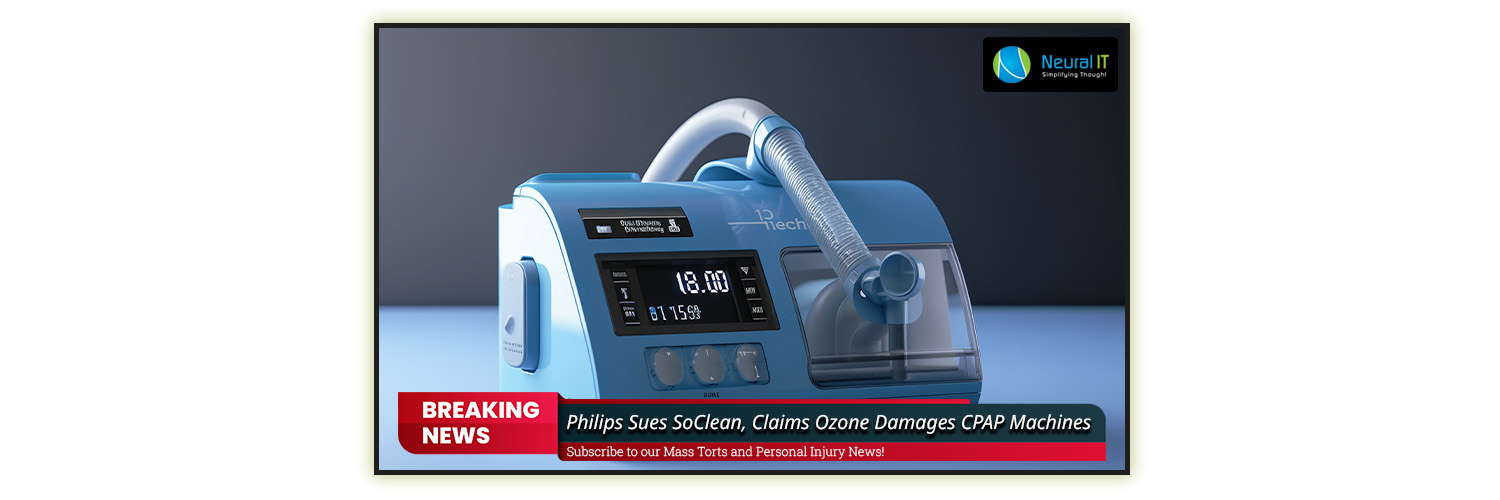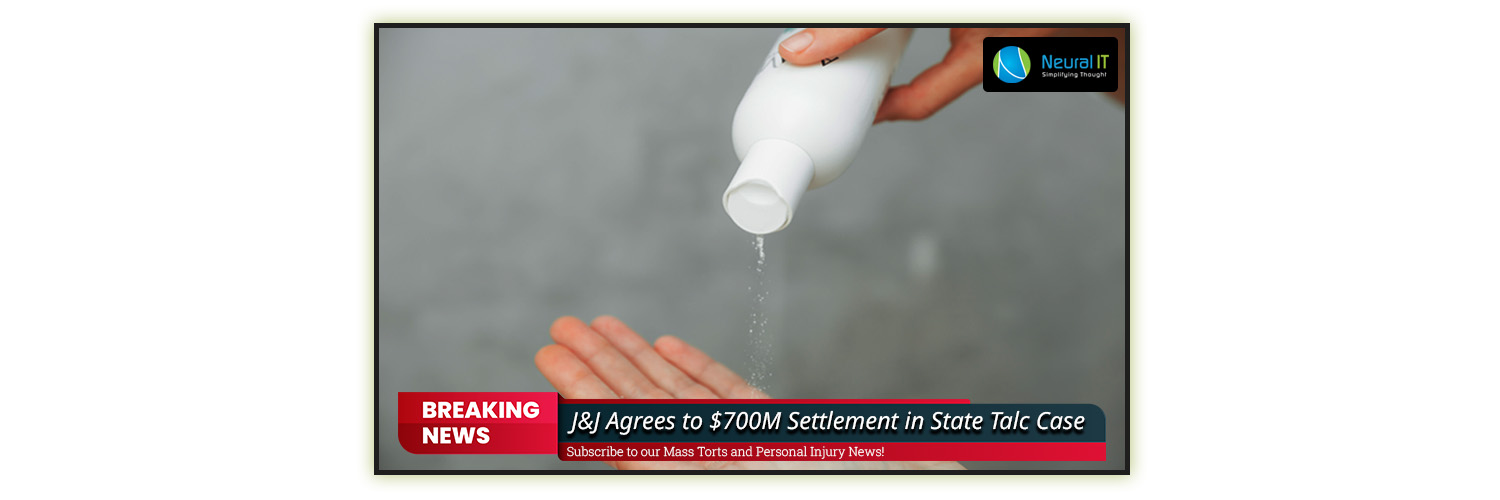Philips Sues SoClean, Claims Ozone Damages CPAP Machines

Amid numerous lawsuits from users of their sleep apnea devices who developed cancer and lung damage, Philips Respironics has sued SoClean.
The lawsuit claims that SoClean irresponsibly advertised their ozone cleaners as compatible with Philips machines, despite knowing the cleaners could deteriorate the sound abatement foam inside the CPAPs.
SoClean, Inc. has been marketing its products for sanitizing and freshening CPAP machines, widely used by Americans to manage obstructive sleep apnea and assist in breathing during sleep. SoClean's cleaning process involves high levels of ozone gas, raising concerns about potential health risks for users, particularly in enclosed spaces.
The safety of SoClean gained attention following Philips' CPAP recall in June 2021. This recall affected millions of DreamStation, CPAP, BiPAP, and ventilators equipped with a polyester-based polyurethane (PE-PUR) sound abatement foam. This foam was found to break down, releasing harmful chemicals and particles into the machines' air pathways.
Those who used these recalled CPAP machines have filed lawsuits against Philips, accusing the company of not revealing defects in the devices. These defects are allegedly responsible for various cancers, respiratory injuries, lung scarring, and other issues due to inhaling particles from the CPAP foam.
Concurrently, there are legal disputes between Philips and SoClean over the part that ozone cleaners may have played in exacerbating the degradation of the CPAP machines.
During the recall of Philips CPAP machines, Philips suggested that the issues with the CPAP foam could be due to the use of ozone-based cleaners like SoClean, which might accelerate foam degradation. In retaliation, SoClean sued Philips months after the recall, arguing that inherent design defects in the CPAP machines were the real reason for the recall, not the ozone cleaning method.
Simultaneously, a series of class action lawsuits were filed against SoClean. These lawsuits claimed that consumers weren't properly informed about the high ozone levels used in their devices for sterilizing and deodorizing CPAP machines. The suits accused SoClean of misleadingly marketing the harmful gas as "activated oxygen."
In response to these issues, the U.S. Food and Drug Administration (FDA) mandated a SoClean recall in November 2023. This decision was based on over 7,400 complaints related to the ozone cleaning devices, including reports of adverse effects like mildew odors, excessive ozone, coughing, and other health concerns. The recall required SoClean to revise their User Manual and provide a hose and mask adapter to mitigate ozone-related health risks.
Due to overlapping legal and factual questions in the lawsuits filed across various federal courts, all lawsuits against Philips CPAP and SoClean have been consolidated. They are now under the jurisdiction of a U.S. District Judge in the Western District of Pennsylvania. The judge is overseeing coordinated discovery and pretrial proceedings in these two separate multidistrict litigations (MDLs) against both manufacturers.
J&J Agrees to $700M Settlement in State Talc Case

Johnson & Johnson has reportedly reached a preliminary agreement in illicit advertising of talc-based baby powder, where it will pay approximately $700 million to settle an investigation by over 40 U.S. states.
This investigation concerns allegations that the company improperly advertised its talc-based baby powder without adequately warning of potential health risks, according to sources familiar with the matter.
This settlement aims to prevent possible lawsuits that would allege J&J concealed any connection between its talcum powder and various forms of cancer. The details of the agreement, including specific terms, are still being finalized between J&J and state attorneys general representatives. The agreement's total value, however, has been agreed upon.
J&J's decision to settle is part of its broader strategy to manage a growing number of lawsuits accusing it of hiding the health risks associated with its baby powder. This follows two unsuccessful attempts to use bankruptcy courts to reach a settlement with former users. The ongoing litigation, which has lasted for over a decade, and the potential for future cancer-related lawsuits, have impacted the company's stock value, according to analysts.
In a previous bankruptcy settlement proposal, J&J officials stated they had allocated $400 million to address consumer protection claims from U.S. states. After negotiations and mediation in December, the company agreed to increase this amount.
To date, only Mississippi and New Mexico have filed formal lawsuits against J&J regarding its talcum powder marketing. In an October securities filing, J&J disclosed that 42 states and the District of Columbia had initiated a joint investigation into the company's promotion of its talcum powder products. State attorneys general, including those from Arizona, North Carolina, and Texas, have requested information about J&J's handling of baby powder risks.
J&J, a leading global healthcare product manufacturer, faces significant legal challenges beyond the state-level claims. The company is dealing with over 50,000 lawsuits alleging it hid the cancer risks associated with asbestos in its talc-based powders to protect one of its iconic products. The majority of these lawsuits involve women who developed ovarian cancer, with others linked to mesothelioma, a type of cancer associated with asbestos exposure.
Most of these lawsuits are centralized before a federal judge in New Jersey. As part of its strategy to manage these lawsuits, J&J previously proposed a $9 billion settlement to resolve all current and future claims, which was linked to the bankruptcy filing of one of its subsidiaries.
Despite the numerous lawsuits, J&J consistently asserts that its talc-based products are safe and do not cause cancer. The company emphasizes that it has responsibly marketed its baby powder for over a century. In its defense, J&J has experienced a mix of legal outcomes – winning several cases in court and getting others dismissed before reaching trial.
This situation highlights the complex legal and public relations challenges J&J faces in addressing the widespread concerns and allegations about its baby powder products. The proposed $700 million settlement with U.S. states, if finalized, would represent a significant step in J&J's ongoing efforts to resolve these issues and move forward.
However, the settlement does not address all the outstanding legal challenges and claims facing the company, indicating that J&J's legal battles and the associated scrutiny over its baby powder products are far from over.
Public Citizen Slams FDA's Opioid Surveillance Plan

A major consumer advocacy group is strongly criticizing a proposed opioid surveillance plan put forth by federal regulators, alleging significant oversights and questionable connections to Purdue Pharma and other opioid manufacturers.
Public Citizen has submitted highly critical public comments regarding the U.S. Food and Drug Administration's (FDA) proposed opioid surveillance plan. This plan allocates public funds to the Research Abuse, Diversion, and Addiction-Related Surveillance Program (RADARS), a program with longstanding ties to the pharmaceutical industry.
The critique from Public Citizen accuses the FDA of providing insufficient details about the opioid surveillance plan and raises concerns about the allocation of public funds for the new program. The group specifically challenges the FDA's decision to direct public funds for opioid surveillance to the RADARS program, alleging that it is "excessively influenced by Purdue Pharmaceuticals and other opioid manufacturers." The response questions the FDA's exclusive focus on RADARS and its failure to direct funds to other drug intervention programs, such as the Substance Abuse and Mental Health Services Administration or the National Institute of Drug Abuse.
Public Citizen points out that RADARS was initially established by Purdue and highlights its involvement in "questionable lobbying efforts by the opioid industry." The letter underscores that two members of the RADARS advisory board reported receiving over $580,000 in financial payments from the pharmaceutical industry between 2016 and 2022, while three members received payments of $1,100 or more in at least one year during the same period.
Additionally, the letter cites a complaint filed by the Colorado Attorney General against Purdue and the Sackler family, emphasizing the intertwined interests of Purdue and RADARS with those of other opioid manufacturers.
Public Citizen's critique extends to the FDA's plan to gather data from patients in opioid treatment, arguing that the agency is overlooking the fact that many individuals in need of addiction treatment do not receive it. The letter contends that the FDA's research will lack crucial data from a significant portion of the targeted population, further accusing the FDA of placing blame on patients for their addiction.
Furthermore, the letter condemns the FDA for not acknowledging its role, along with that of the opioid industry and overprescribing doctors, in bearing "substantial responsibility" for the origins of the opioid epidemic.
The FDA's plan, unveiled on October 17, 2023, is part of the agency's broader initiatives to address the ongoing opioid epidemic. These initiatives include the recent announcement of mandatory warning labels for all opioid painkillers. Public comments on the surveillance plan were accepted until December 18, 2023, and the FDA will consider these comments, along with recommendations from industry experts, before finalizing the regulations for the surveillance plan.
